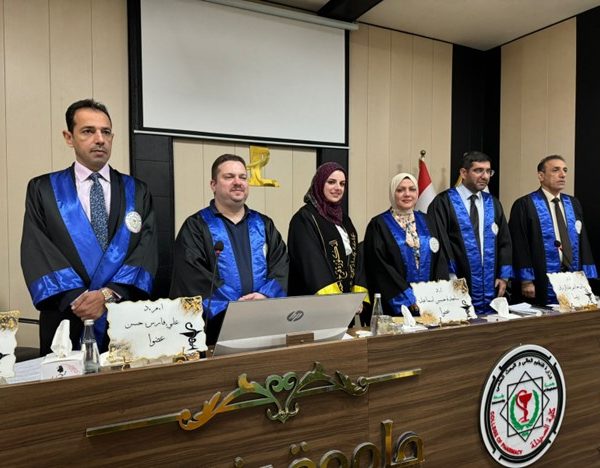The College of Pharmacy discussed the PhD dissertation entitled “Possible Protective Effects of Myricetin Prior to 5 Fluorouracil-induced Mucositis and Hepatotoxicity in Male Rats” by the student Farah Ahmed Hassan and the supervisor, Professor Dr. Nada Naji Alshawi, at the Pharmacology and Toxicology Department. The study aimed to demonstrate the molecular mechanisms of toxicity (oxidative stress, inflammation, and apoptosis) induced in the liver and jejunum by 5-fluorouracil (5-FU), and to investigate the protective effects of two doses of myricetin, each administered alone and before a single dose of 5-FU (20 mg/kg), by assessing selected parameters. The study included 42 healthy adult Wistar male rats weighing 120-150 g, which were divided into six groups of seven rats each. Myricetin (25 or 50 mg/kg/day) dissolved in 5% tween solution was administered orally for 20 days, then a single toxic dose of 150 mg/kg of 5-FU was intraperitoneally injected on day 21. Twenty-four hours after the end of treatment duration, the rats were euthanized under diethyl ether anesthesia and then sacrificed by cervical dislocation; blood was obtained from the carotid artery from the neck to obtain serum, which was used for the determination of liver function tests; moreover, each rats’ jejunum and liver tissues were quickly excised, rinsed with phosphate buffer saline (PBS, pH 7.4) and utilized for analyses of biochemical, Western blot, quantitative reverse transcriptase polymerase chain reaction, and histopathological architectures examination. The study showed that myricetin, in a 25mg/kg/day dose, had a better protective effect against 5-FU-induced jejunum mucositis and hepatotoxicity in rats via improving selected oxidative stress parameters, and it also had anti-inflammatory and anti-apoptotic effects. The study recommended investigating the possible protective effects of myricetin against other tissue toxicities induced by drugs, including chemotherapeutic drugs.




